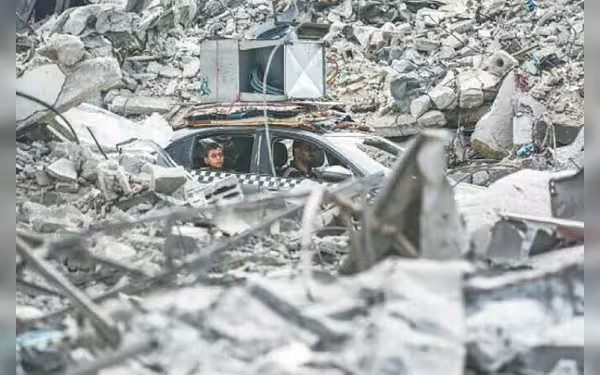Saturday, November 16, 2024 05:48 PM
Israeli Forces Kill 27 Palestinians in Gaza Escalation
- Israeli airstrikes result in 27 Palestinian deaths.
- Displaced families face dire humanitarian conditions.
- International community seeks ceasefire amid ongoing violence.
 Image Credits: dawn
Image Credits: dawnIsraeli forces' airstrikes in Gaza lead to 27 Palestinian deaths, worsening the humanitarian crisis as international efforts for a ceasefire continue.
The ongoing conflict between Israel and Hamas has escalated dramatically, leading to devastating consequences for the people of Gaza. On Friday, Israeli forces conducted tank and air strikes in the northern and central regions of the Gaza Strip, resulting in the deaths of at least 27 Palestinians, according to medical sources. This violence comes amid a backdrop of intense fighting, not only in Gaza but also along the Lebanon-Israel border, where Hezbollah, an ally of Hamas, has been involved in the conflict.
As the situation worsens, many Palestinians who have been displaced by the Israeli military actions express their fears. Some have taken refuge in temporary camps along the beach, only to worry that high waves could wash away their makeshift shelters. Reports indicate that shelling from Israeli tanks has already claimed the lives of eight individuals and injured several others in the Nuseirat refugee camp. Additionally, airstrikes in Gaza City and Beit Hanoun have resulted in further casualties, though it remains unclear how many of the deceased were combatants and how many were innocent civilians.
In Rafah, where Israeli forces have been active since May, tanks have advanced further into the area, supported by airstrikes. Residents describe a scene filled with heavy gunfire and explosions, as Israeli forces reportedly demolish homes in their pursuit of Hamas fighters. The armed wing of Hamas has stated that their fighters are engaged in fierce battles against the advancing Israeli troops.
The Israeli military claims that their operations in Rafah have led to the deaths of hundreds of Palestinian fighters, the discovery of tunnels, and the destruction of critical infrastructure. However, the ongoing conflict has raised significant concerns about the humanitarian situation in Gaza. The international community, including the United States, Qatar, and Egypt, has been attempting to broker a ceasefire between Israel and Hamas, but progress has been slow. Key sticking points include Israel's insistence on maintaining control over the southern border with Egypt and the terms of a potential prisoner exchange.
For many displaced Palestinians, the situation is dire. Shaban, a 47-year-old electrical engineer who fled Gaza City, voiced the fears of many when he said, "Enough, enough, enough. We were pushed by the occupation (Israel) to the sea, where we believed it was safe. Last week, the sea flooded and washed away some tents, and that could happen again. Where would we go?" His words reflect the desperation felt by countless individuals who have lost their homes and livelihoods.
This latest round of violence is part of a long-standing conflict that has seen cycles of aggression and retaliation. The current hostilities were ignited on October 7, when Hamas launched an attack on Israel, resulting in the deaths of approximately 1,200 people, according to Israeli sources. In response, Israel's military campaign in Gaza has reportedly led to the deaths of over 41,000 Palestinians, as stated by local health officials. The humanitarian crisis has reached alarming levels, with nearly the entire population of Gaza, estimated at 2.3 million, displaced and facing severe food shortages.
As the world watches this tragic situation unfold, it is crucial to remember the human cost of this conflict. The lives lost, the families torn apart, and the communities devastated by violence serve as a stark reminder of the urgent need for a peaceful resolution. The international community must continue to advocate for dialogue and understanding, striving to bring an end to the suffering of innocent civilians caught in the crossfire.













